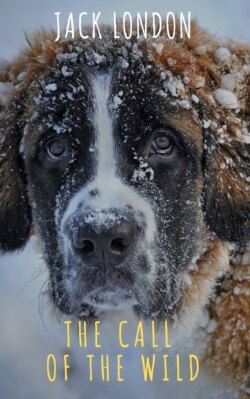The Call of the Wild: The Original Classic Novel

Реклама. ООО «ЛитРес», ИНН: 7719571260.
Оглавление
The griffin classics. The Call of the Wild: The Original Classic Novel
The Call of the Wild. Jack London
Chapter 1 Into the Primitive
Chapter 2 The Law of Club and Fang
Chapter 3 The Dominant Primordial Beast
Chapter 4 Who Has Won to Mastership
Chapter 5 The Toil of Trace and Trail
Chapter 6 For the Love of a Man
Chapter 7 The Sounding of the Call
Отрывок из книги
Table des matières
The Call of the Wild
.....
But the saloon-keeper let him alone, and in the morning four men entered and picked up the crate. More tormentors, Buck decided, for they were evil-looking creatures, ragged and unkempt; and he stormed and raged at them through the bars. They only laughed and poked sticks at him, which he promptly assailed with his teeth till he realized that that was what they wanted. Whereupon he lay down sullenly and allowed the crate to be lifted into a wagon. Then he, and the crate in which he was imprisoned, began a passage through many hands. Clerks in the express office took charge of him; he was carted about in another wagon; a truck carried him, with an assortment of boxes and parcels, upon a ferry steamer; he was trucked off the steamer into a great railway depot, and finally he was deposited in an express car.
For two days and nights this express car was dragged along at the tail of shrieking locomotives; and for two days and nights Buck neither ate nor drank. In his anger he had met the first advances of the express messengers with growls, and they had retaliated by teasing him. When he flung himself against the bars, quivering and frothing, they laughed at him and taunted him. They growled and barked like detestable dogs, mewed, and flapped their arms and crowed. It was all very silly, he knew; but therefore the more outrage to his dignity, and his anger waxed and waxed. He did not mind the hunger so much, but the lack of water caused him severe suffering and fanned his wrath to fever-pitch. For that matter, high-strung and finely sensitive, the ill treatment had flung him into a fever, which was fed by the inflammation of his parched and swollen throat and tongue.
.....